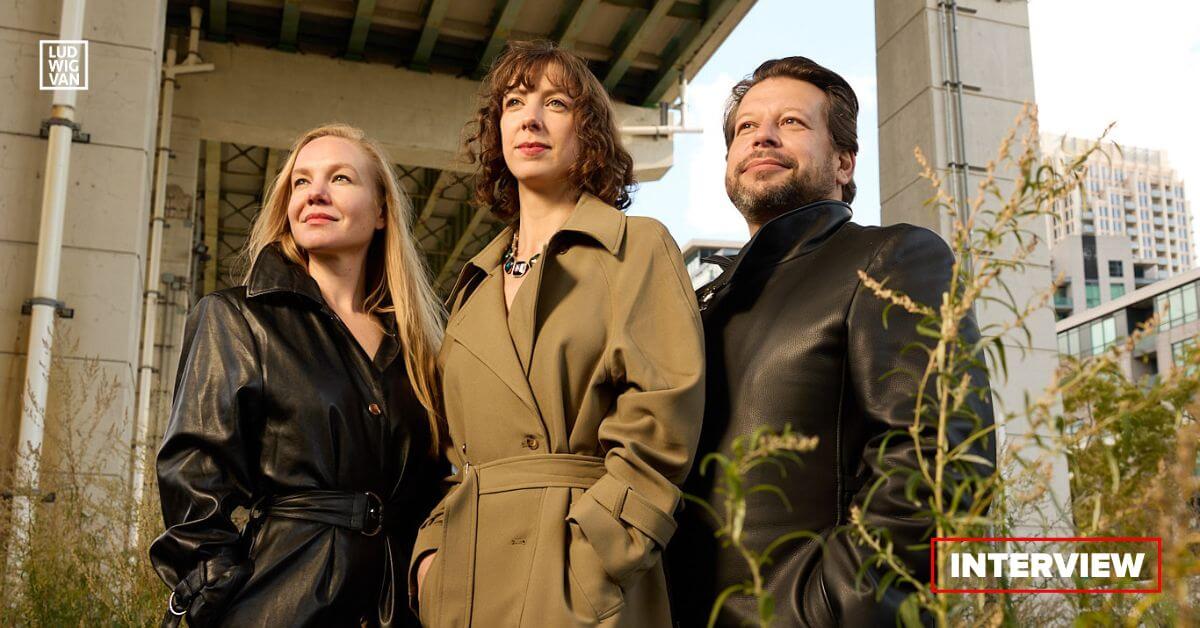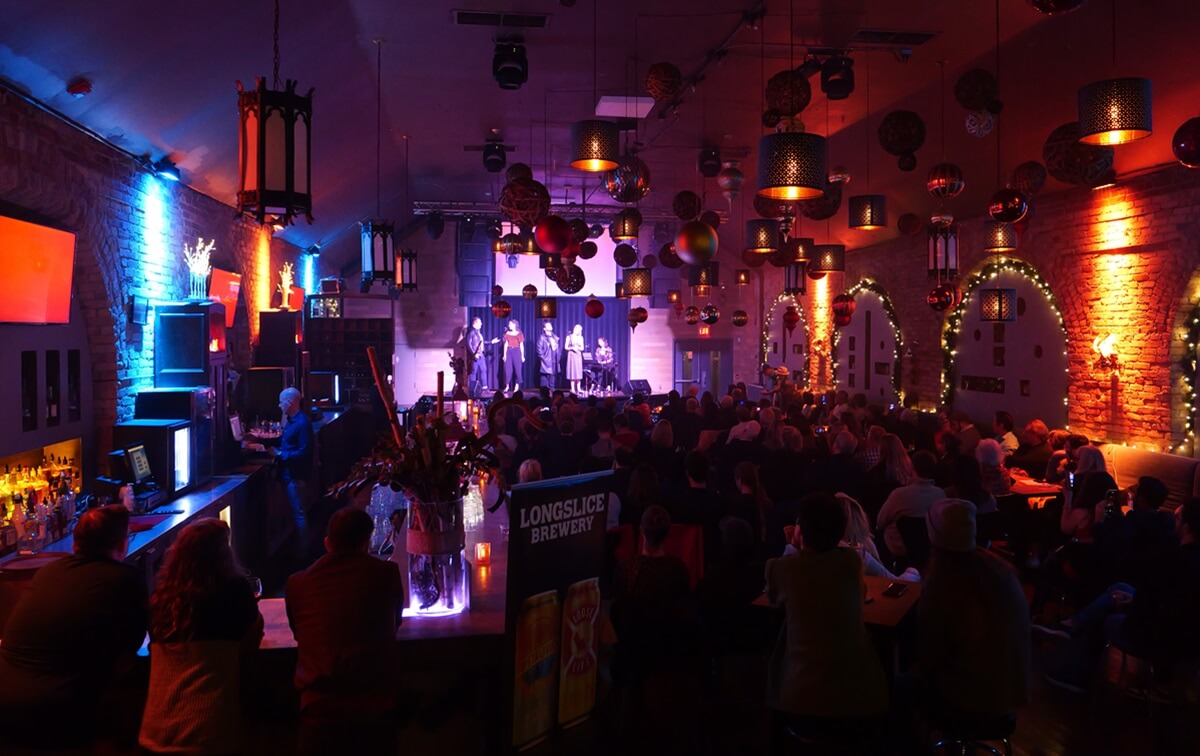
It was in 2017 that Opera Revue was founded by soprano Danie Friesen as a way of taking the art form to a wider audience, including those who wouldn’t go to see it in its usual formal environment.
“I originally started it six, seven years ago now,” Danie says. “I came to opera later, in my 20s,” she explains. While she came to love opera, friends would complain that it was expensive and inaccessible. “It started with an argument with my ex,” she laughs.
It sparked an idea. “Maybe, how we present it, especially to newer audiences, could be done differently.”
Putting arias into neighbourhood pubs was the first step.

Opera In The Hood
As Danie relates, the idea crystallized via a chance connection. “A friend of mine owns a bar in the Beaches,” she explains, “it was his idea to do a show in his place first.” As it typical with small venues, he wanted a quick date, and the very first show was put together in about six weeks.
“It was packed immediately,” Danie says. “After that we kind of built a bit of reputation.”
Pianist Claire Elise Harris joined OR in 2018, and the core team was rounded out by baritone Alexander Hajek in 2021. Alex could see that, even in the relatively diverse Toronto opera world, there was a niche they could fill. “This sort of opera cabaret doesn’t exist,” Alex says.
“We like to fill in a bit of a gap,” he adds.
Some of the other venues they approached may have been leery at first of what they saw as a very nichey kind of act, but most came around.
They’ve staged performances at neighbourhood bars in Toronto, including the Dakota Tavern, Castro’s Lounge, Granite Brewery and The Emmet Ray. During the pandemic lockdowns, OR produced a series of weekly YouTube videos titled the Isolation Series, including both opera and opera parodies. The latter were immediately popular.
Their programmes typically include a selection of pieces drawn from various repertoire — a kind of opera’s greatest hits, along with the odd musical theatre piece. OR is also becoming known for their opera parody pieces, many of which take a swipe at the vagaries of Toronto life, including municipal politics and social issues like the homeless crisis.
There is a Toronto guest artist at most shows, along with the trio. Alex reports he’s had little trouble recruiting fellow singers he connects with at other gigs in town once they learn about how much fun it is.
“No two shows will be the same,” says Alex.
Crossover shows add opera to other experiences, including their Tasting Notes: Wine meets Opera and Opera/Burlesque shows titled Debauchery at The Dakota. Crossover events have proven to be a big hit with audiences. At the wine tasting/opera shows, each piece performed is paired with a specific wine. The burlesque shows add a whole new dimension.
“That show is a riot,” says Alex.
“Crossover has been a really interesting way to introduce people to opera,” says Danie.
In the end, the venues appreciate a show that can bring in a customer base outside their regulars. Alex says staff have been known to change their shifts to be able to work one of OR’s shows.
It’s About The Audience
Overall, it’s about a philosophy of inclusion. Why should opera be reserved for those who can afford not only an expensive ticket, but also in a formal concert hall atmosphere? More pointedly: why are audiences (particularly younger members) staying away from traditional opera performances?
“When people do come to our shows, we get a lot of new people, a lot of young people,” Danie says.
They report that the people they’ve reached have been diverse and multi-generational, including established opera fans as well as what they call the opera curious. Then, there are those who stumble into the experience as an unexpected addition to their evening at the bar. It’s pretty easy to persuade them to stay. “You gotta give it a try,” Danie says. She points out that part of the accessibility factor is the idea that there’s no big outlay on tickets.
Alex mentions that OR has just finished a tour of Ontario small town bars from Peterborough to Picton. He points out that the COC, at one time, toured outside Toronto to bring opera to smaller centres. “We just finished a tour of Southern Ontario,” he says. “People want to hear this stuff, and they really don’t care where.”

Some of the audience reaction has been on the unexpected side — like the patrons who complained about the inclusion of a Fauré selection, or who wanted to let him know how much they hated Puccini. “It’s wildly specific,” he says.
Singing in English is another important element of their shows. Alex came from a traditional background, studying in conservatories. He admitted that his own reaction to Danie’s ideas was initial surprise. “The idea of changing the language to fit the vernacular shocked me,” he says. But, he points out, it creates a more immediate connection with their audiences.
Some people drift by because they can hear it from a block away, and they’re simply drawn to the sound.
The three mention a favourite moment from their performances. A man in his 30s ventured into the Emmet Ray during one of their performances, and it was clear he’d already imbibed a drink or two before. Initially confused, he asked what was going on, and was persuaded to stay and find out. At a certain point during the performance, they could see him sitting in the audience, weeping as he listened. He explained to them after that he’d never heard such music before, and that he’d been completely transported by it.
“He was very confused,” Danie says of his reaction. “That’s my audience. That was such a fresh moment.”
He’s not the first person to tell them they were unexpectedly moved by an operatic aria. “There’s something about hearing the human voice unamplified,” Danie says.
“It’s special,” Alex agrees.
“A lot of people aren’t used to that,” Danie adds.
It’s not about dumbing down opera.
“[It’s] a gateway drug to opera,” Danie says. In fact, Danie reports that audience members have told her about buying tickets to a formal staged opera because their interest was piqued at one of OR’s shows.
Next Shows
Their upcoming gala show on December 3 will take a lighthearted approach. “That’s going to be all opera parodies,” Alex says.
There will be surprise guests at what will be their second gala show. “It’s going to be a party,” he adds.
- Along with the Ruckus!At The Revival opera parody show on December 3, you can check out all their upcoming gigs [HERE].
Are you looking to promote an event? Have a news tip? Need to know the best events happening this weekend? Send us a note.
#LUDWIGVAN
Get the daily arts news straight to your inbox.
Sign up for the Ludwig Van Toronto e-Blast! — local classical music and opera news straight to your inbox HERE.
- PREVIEW | SUMMER OPERA LYRIC THEATRE Presents Handel’s Xerxes, Mozart’s Idomeneo & Puccini’a La Boheme July 26 To August 4 - July 26, 2024
- PREVIEW | YENSA Festival V.2 Offers Black Flames Performances & Other Ways To Celebrate Black Women In Dance - July 25, 2024
- PREVIEW | Canadian Talent Conspicuous In The Met: Live In HD 2024-25 Season - July 25, 2024



